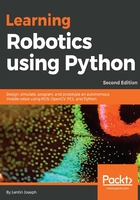
上QQ阅读APP看书,第一时间看更新
The ROS community level
The ROS community consists of ROS developers and researchers who can create and maintain packages and exchange new information related to existing packages, newly released packages, and other news related to the ROS framework. The ROS community provides the following services:
- Distributions: A ROS distribution has a set of packages that come with a specific version. The distribution that we are using in this book is ROS Kinetic. There are other versions available, such as ROS Lunar and Indigo, which has a specific version that we can install. It is easier to maintain the packages in each distribution. In most cases, the packages inside a distribution will be relatively stable.
- Repositories: The online repositories are the locations where we keep our packages. Normally, developers keep a set of similar packages called meta packages in a repository. We can also keep an inpidual package in a single repository. We can simply clone these repositories and build or reuse the packages.
- The ROS wiki: The ROS wiki is the place where almost all the documentation of ROS is available. You can learn about ROS, from its most basic concepts to the most advanced programming, using the ROS wiki (http://wiki.ros.org).
- Mailing lists: If you want to get updates regarding ROS, you can subscribe to the ROS mailing list (http://lists.ros.org/mailman/listinfo/ros-users). You can also get the latest ROS news from ROS Discourse (https://discourse.ros.org).
- ROS answers: This is very similar to the Stack Overflow website. You can ask questions related to ROS in this portal, and you might get support from developers across the world (https://answers.ros.org/questions/).
There are many other features available in ROS; you can refer to the ROS official website at www.ros.org for more information. For now, we will move on to the installation procedure of ROS.